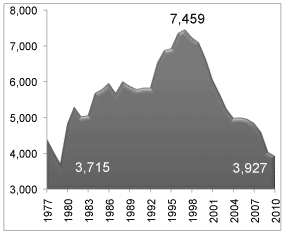Midpack
Give me a museum and I'll fill it. (Picasso) Give me a forum ...
Read this on another forum, something I hadn't realized (among many things). FWIW...
The Wilshire 5000 was so named in 1970 because that was approximately the number of listed stocks on NASD, AMEX, and NYSE at the time. The number has varied since, hitting a peak in July 1998 at 7,562 listed stocks. The Wilshire 5000 held 4,009 companies on December 31, 2010.
Today, December 31, 2011, the Wilshire 5000 holds 3,761 stocks, according to Robert Waid, Managing Director at Wilshire Analytics. This is about half the number of stocks at the peak in 1998 and very close to the absolute low of 3,715 in 1978. I would not be surprised to see the Wilshire 5000 hit a new low in listing during the first half of 2012.
There are far more US stock mutual funds and ETFs than there are listed US stocks. Most companies have little incentive to go public today. There is significant private money looking for investment and borrowing costs are rock bottom. Also, the government has not helped by significantly increasing the regulatory burden on public companies over the past decade. Investors are wise to hold international equities just for the company diversification alone.
Rick Ferri

